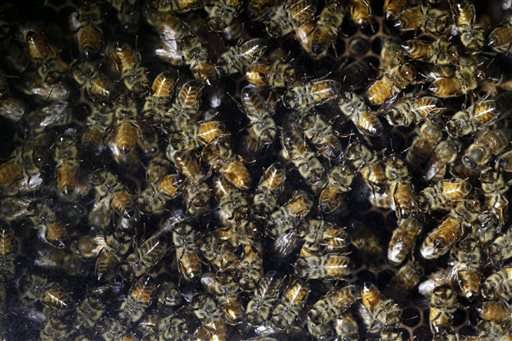Garden-care giant to drop chemicals linked to bee declines

Amid ominous warnings about threats to pollinators and the food crops they make possible, garden-care giant Ortho said Tuesday it will stop using a class of chemicals widely believed to harm the most important pollinators of all: bees.
Bees are critical to the food supply because about one-third of the human diet comes from insect-pollinated plants, and honeybees are responsible for 80 percent of that pollination. Concern about bee health is growing, with federal officials considering whether to protect two species of wild bumblebees.
Ortho said it has already removed neonicotinoids from the majority of its products used to control garden pests and diseases. It plans to remove it from all the rest in two to five years.
The company is believed to be the first garden products brand to announce it will stop using the chemicals, said Lori Ann Burd, director of the Environmental Health Program at the Center for Biological Diversity.
She called it "fantastic news."
The chemicals, called neonics for short, attack the central nervous systems of insects, killing them or making them vulnerable to predators and deadly diseases, researchers say.
Neonics and other pesticides, along with disease and declining diversity in gardens and landscapes, are among the causes of declining bee populations worldwide, a United Nations study released in February said.
Eliminating neonics from Ortho products might require gardeners to apply them more frequently, but it will be easier to target pests while reducing the chances of hurting bees, said Tim Martin, the company's vice president and general manager.
Ortho is a division of Marysville, Ohio-based Scotts Miracle-Gro Co. The parent company reported sales of $3.02 billion last year but doesn't break out statistics for its divisions.
The severity of neonics' effects on bees appears to vary depending on the type of crops they are used on, according to a study by the U.S. Environmental Protection Agency and California's environmental agency released in January. Another study published last year says neonics might hit wild bumblebees harder than domestically raised honeybees.
Bayer CropScience and Syngenta, the top manufacturers of neonics, have said the research has exaggerated the risks and understated the benefits.
The Maryland General Assembly passed a bill last week that would allow only certified applicators, farmers and veterinarians to apply pesticides containing neonics.
In March, the U.S. Fish and Wildlife Service said it would consider whether to protect two species of wild bumblebees under the Endangered Species Act amid declines in their numbers.
The environmental group Defenders of Wildlife, which asked federal officials to consider protecting the bees, said neonics were a factor in the bees' decline.
It's not yet clear what effect Ortho's decision will have on the health of the overall bee population. Neonics are used in a number of chemicals applied to food and textile crops such as corn and cotton as well as home gardens.
But May Berenbaum, a bee expert and professor of entomology at the University of Illinois, said homeowners use a significant amount of pesticides, and introducing alternatives to neonics is important.
"There are still profound problems (for bees), but this is a step toward removing one contributor to some of the problems," she said.
Berenbaum cautioned that the replacement pesticides could have their own problems. "This is not the end. This is no time for complacency," she said.
© 2016 The Associated Press. All rights reserved.
















